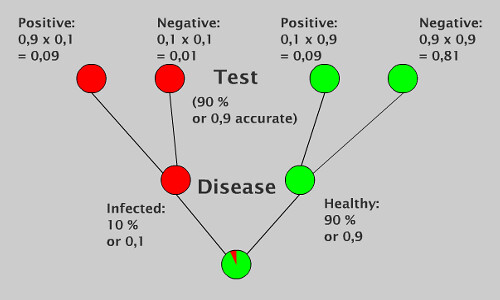The laws of thermodynamics
The laws of thermodynamics describe energy flow in thermodynamic processes. In simple terms, they describe the flow of heat. I was introduced to these laws in chemistry, where we basically used the laws to determine whether reactions are exothermic (release heat) or endothermic (absorb heat). There are four laws of thermodynamics, namely:
- Zeroth Law: There is a regression towards thermal equilibrium. This law is necessary to define heat flow and was added after the others, hence the number 0. It is also a bit of a geek joke to start numbering from 0, in case you were wondering.
- First Law: Matter and energy are conserved. You cannot create matter or energy, you can only let them change forms. This means the song Making love out of nothing at all by Air Supply is horse shit, and not only because it's lame and it makes me increase entropy by vomiting.
- Second Law: Entropy always increases. Entropy means different things in different disciplines. In information science, entropy is a measure of chaos. More entropy means more chaos. In physics, entropy is an indication of available energy. More entropy means less available energy. Ultimately, any work performed tends to release energy, meaning your available energy decreases. This means that Sepultura is right: Chaos A.D.
- Third Law: Absolute zero is unattainable. This means that there is no scale ranging from a definite cold point to a definite hot point. You have hotter and colder, but this is relative to the participants in your thermodynamic system. Taking away things that make heat is not a certain way to make your system colder because you have to play the game and you're not the only one playing.
How to remember the laws of thermodynamics
C. P. Snow (that's Charles Percy Snow, not 'see and pee snow', smart ass) devised these rules for the layman (he had other plans for lay women. Plans that involved yellow snow):
- You have to play the game. C. P. Snow did not devise this rule, but it was added later with the Zeroth Law.
- You cannot win. The more you fight, the more the system fights back. If you quit fighting, you're still fighting.
- You cannot break even, except if it gets extremely cold. This means that you can only truly break even when thermal equilibrium is at a final minimum.
- It doesn't get that cold. Meaning, it doesn't get cold enough to establish a definite, final thermal equilibrium that will never change again.
How do the laws of thermodynamics dictate climate change?
The earth is viewed as a closed thermodynamic system. This means that the earth is the equivalent of a big greenhouse. Closed thermodynamic systems can exchange energy, but not matter, with its surroundings. The greenhouse gets energy from outside and releases energy to the outside - even though it does trap some of that energy inside. The greenhouse does not however move matter in and out through its glass panes, unless there's a poltergeist at work.
The Zeroth Law says Mother Earth has to play ball
It is important to note that no system can be truly closed. This is where the zeroth law of thermodynamics comes into play (you have to play the game). Your greenhouse will have a sun that heats it. Not only the sun, but also other greenhouses may exchange energy with your greenhouse, and in turn your greenhouse exchanges energy with them. This exchange carries on until thermal equilibrium is reached. This thermal equilibrium is not necessary at a warmer or colder point than from where we started, as no thermodynamic system is truly closed. There are more greenhouses than we could ever count.
The First Law says Mother Earth has to crack a few eggs to bake an omelette
We have to leave carbon footprints. Of course we can argue for or against bigger carbon footprints, but the fact remains that life on this planet needs to happen, and it needs to make carbon dioxide while happening.
The Second Law says Mother Earth is going to get hot - maybe
This is because as soon as we have a colder, smaller footprint, our greenhouse is colder than the one next door. Our greenhouse then sucks the heat from that one, until thermal equilibrium is reached once again. This is inevitable for as long as we have a closed thermodynamic system.
For as long as we live in the hypothetical greenhouse, there is no way of ensuring that our greenhouse will get colder by making the things inside colder. Your fridge does not turn into an oven when you put a cup of smoking hot coffee inside it. Similarly, your oven does not turn into a fridge when you leave a tray of ice cubes inside it while it is on. The only way to ensure this scenario is by moving towards a point of absolute zero. That is, by switching off the oven, by unplugging the refrigerator and leaving them both wide open.
The Third Law says we can't unplug the sun
Switching off the oven and unplugging the refrigerator will not make us cooler, unless of course we were in Knysna or in Cape Town. It will make our carbon footprints smaller, but it's just not cricket. Since there is no absolute zero, we have no way of guaranteeing that we're going to go from warmer to colder by making our carbon footprints smaller.
I'm not saying don't hug the trees
Finally, I'd like to make it clear that I'm not suggesting we should do away with environmentalism. Certainly it is important to be conscientious and to take good care of our environment. It might not make the world a colder place, but it will make the world a more habitable place for ourselves and our fellow toxic carbon dioxide emanating friends. I do not however believe that any amount of paid vacations to Copenhagen or Kyoto for politicians who want to cap and tax carbon emissions on the one hand while saving the most toxic industries on the other hand is a smart way to ensure that people leave smaller carbon footprints. The fuel guzzlers of General Motors, the new hybrid cars in lieu of other alternatives and our own Eskom - dubbed the number one pollutant in the world - who still want to build coal stations in lieu of cleaner, safer, nuclear stations seem to suggest that there are ulterior motives. These motives are not guided by science nor by morality, but by the darker, colder side of human nature.
What is the answer?
Deregulate the energy industries and allow the market - which has long since indicated that it is ready for green fuel - to dictate what kind of cars we drive, the kind of energy we'd like and the kind of footprints we want to leave. If you are unhappy about your fuel guzzler, R & D something better and sell it to your neighbours. If you can manufacture it cleaner, safer and with less bureaucracy, why not? If you can't, you risk losing out to your neighbour who can.
Why global warming is a real threat
Global warming is a very real threat, but not due to environmental reasons. It is a threat to individual liberty. Without the freedom to produce what you'd like and how much of it you'd like to produce, we are at risk of losing economic specialisation. Without specialisation, we are at risk of returning to sustenance farming - if we are lucky. If we are not this lucky, we return to feudalism where we can only grow or produce what we are legally allowed to produce, and how much we are dictated to produce by Big Bother. Whether this results in a bigger or smaller carbon footprint is immaterial, thanks to the laws of thermodynamics and our closed system. We could of course destroy the ozone layer and shake things up a bit, but this might not be too wise (a bit like unplugging the sun, which again is no guarantee).
"Without deviation from the norm, progress is not possible" - Frank Zappa
More regulation means less opportunities to deviate from the norm, which in turn means less progress. Something to consider before we chant for our alpha primates to sign dotted lines on paid vacations in exotic locations.
































